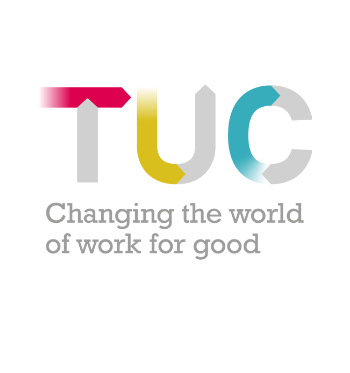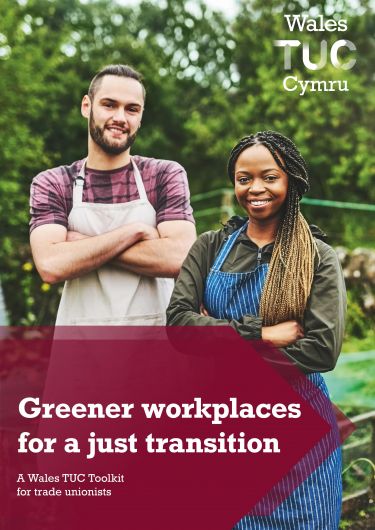Wales TUC Greener workplace network - Building workplaces campaigns in the run up to COP26
A big thank you to all the reps who took part.
The session included:
A presentation from Jo Rees, Wales TUC Policy and Campaigns officer on COP26, Climate Change and Just Transition. The presentation outlined the background to the UN climate summit in Glasgow this November, and trade unions’ role and priorities for the summit. It also included an update on climate action in Wales, Wales TUC priorities on just transition and key campaign dates ahead of COP26, including:
Climate and Employment Proof Our Work (#CEPOW) – 22nd September
In the run up to COP26, the Wales TUC is supporting the global day of action to ‘Climate and Employment Proof Our Work’ on 22nd September. This day is an opportunity to be part of a global conversation taking place in workplaces across the world. On this day, trade union reps are invited to start a conversations about what can be done to protect climate and jobs in their workplaces. This could involve setting up a meeting with the employer to discuss what climate change means for your workplace and activities like setting up a discussion or awareness raising event with members.
We know that reps and branches will be at different stages on this. It doesn’t matter where you are starting from, the important thing is to get a discussion going! To help reps prepare, we have lots of resources:
- Take our 15-minute online learning module ‘Climate Change Proof Your Work’ to help you plan ahead for the day
- Download our template letter to help you structure a conversation with employers
- Adapt this online members’ template survey to help you gather members’ views on green workplace issues (with thanks to Nic Savage from GMB for sharing this)
- Plus find lots of other ideas and resources in our Greener Workplaces for a Just Transition toolkit (Eng) (Cym).
The International Trade Union Confederation (ITUC) who are leading the campaign, have a campaign page with more resources here and are also offering a live online training briefing for reps on 23rd August – register here. You can also speak to your own union to see what resources and support they can provide. If you’re sharing any of your branch’s activities as part of the day on social media remember to use the hashtag #CEPOW and tag @WalesTUC (Twitter) or @WalesTUCCymru (Facebook and Instagram) so that we can share your posts.
Graham Petersen from the Greener Jobs Alliance gave an update on COP26 from the Greener Jobs Alliance perspective. He also talked about some of the activities unions are involved in at a UK level to support environmental education and green skills, and the campaign to get workplace environmental issues and green reps on the same footing as the Health and Safety at Work Act and health and safety reps. He explained that this could be achieved by putting in place a legal requirement for organisations to carry out carbon management plans and green skills audits together with a requirement to engage with unions on green issues and recognise and provide facility time for green reps. For more information and all the latest campaign news from the GJA – see their newsletter.
John James, Trade Union Education Coordinator at Coleg Gwent talked through some of the new courses available through trade union education to support reps in workplace campaigns for a just, green transition. He showcased the new 15-minute e-learning module ‘Climate Change Proof Your Workplace’ and talked about the two new courses available to reps this September:
Greening Our Workplaces – ‘green skills’ for trade unionists
Negotiating for a Just Transition – a course for union reps
Next, Sam Ward, Campaign Manager at Climate Cymru gave a presentation to introduce the Climate Cymru campaign. Climate Cymru is a gathering of voices from all over Wales. It has partners drawn from across civil society and beyond who all want to see meaningful action on climate change to protect the Wales we love and make a better future for communities here and around the world. Wales TUC has signed up as partner to Climate Cymru to campaign on common aims of a just and ambitious climate transition.
Sam explained how organisations can sign up to become a partner of Climate Cymru. He also explained different opportunities to get involved in the campaign. For example, Climate Cymru have some great awareness raising resources available including being able to help you set up your own workplace/e-community screenings of a new David Attenborough film, A Life On Our Planet (watch the trailer here).
Here’s more information from Sam about how to set up a film screening:
“All you need is 10+ people who would like to watch the film together. The film showings could be online or in person. Climate Cymru will have an ambassador to introduce Climate Cymru and the film, run the technical aspects of digital film showing, and help manage a discussion afterwards. At the tail end of the session there will also be the chance for participants to have their say and add their voice to the campaign for those keen to do so. The film showings are free.
If you want to hold an “in person” film showing, you will need to sort the venue, screen and an internet connection and Climate Cymru can set up the film digitally. We may in some circumstances be able to have an ambassador be present in person, but this will be location and date specific and we won’t be able to confirm this for a little while yet.
Please email helo@climate.cymru to register your provisional interest, or even better let us know a time and a date and we’ll get that locked in and sorted.”
Check out the Climate Cymru website for details of other free training sessions available the other events that are going on as part of Big Green Week.
Nicola Savage, Regional Organiser for GMB and the Wales TUC representative on the Decarbonisation Strategy Panel gave an update on the decarbonisation of the public sector in Wales and the trade union role in this. She explained how early engagement with unions is key when employers are making their net zero plans and shared a copy the Net zero carbon status by 2030: public sector road map. She also shared the online template survey she has set up on Microsoft Forms which she kindly shared so others can copy and adapt.
Discussion groups
Reps then took part in discussion groups which looked at ideas for action and key issues and barriers. The groups identified the following key points:
- Training on green issues is a priority – and now is a good time to push for release with the extra profile of environmental issues because of COP26.
- Reps reported that Carbon Literacy training had been a successful way to engage members and non-members alike.
- Surveying members was also seen as key to identifying the issues.
- Overlap between green and health and safety issues – support for UK level campaign for something similar to the HSAWA to cover climate and environment.
- Getting top-level management buy-in is key.
- Getting environmental issues on the agenda for meetings important.
- Getting support from others in the branch – but some capacity issues due to Covid issues and other branch work-load.
- Transport issues – specifically rebuilding confidence in using public transport and strengthening Wales’ public transport were seen as key issues.
- The role of flexible working and virtual meetings and the advantages/disadvantages of these were also discussed.
- For the Welsh public sector, the role of the reporting and monitoring requirements for the Well-being of Future Generations Act and also the role Public Service Boards in the greener workplaces agenda was highlighted. Getting green issues and the role of unions recognised as part of these was highlighted as important.
- The availability of affordable green housing was also flagged.
- The role of climate education within schools.
Some links/further information on the topics touched on in the discussion and Q&A:
Schools
Teach the Future Wales – youth-led campaign to get climate education on to the curriculum
Transport
Watch Chris Roberts (sustainable travel writer and campaigner) talk on sustainable travel at a previous Wales TUC event and read our guide to campaigning for more sustainable workplace travel in the Greener Workplaces toolkit (see pages 79-90) – also written by Chris.
See the Welsh Government’s new transport strategy.
Access to green skills for freelancers and casual workers
There are some individualised funds that can provide access to green skills training for workers in these groups– this would be Personal Learning Accounts (PLAs) or the Wales Union Learning Fund (WULF) at the moment. PLAs in particular are aimed at those either earning under £26k or on a zero hour contract, at risk of redundancy or an agency worker. Personal Learning Accounts | Careers Wales (gov.wales). WULF can also provide funding for individuals, but which project will work with them depends on whether they are in a workplace that is willing to work with unions.
If the employer or workplace that they are in makes a business decision to retrain staff to update skills and become more green, then union learning reps can encourage and support them to access funding via the FE sector, using either the flexible skills funding or core FE or WBL funding. Some of the city/regional growth deals also have funding available which employer’s can access in certain circumstances.
If you want more help and advice re: accessing green skills contact Wales TUC wtuc@tuc.org.uk and we can advise and put you in touch with key union learning contacts who can provide further workplace support.



